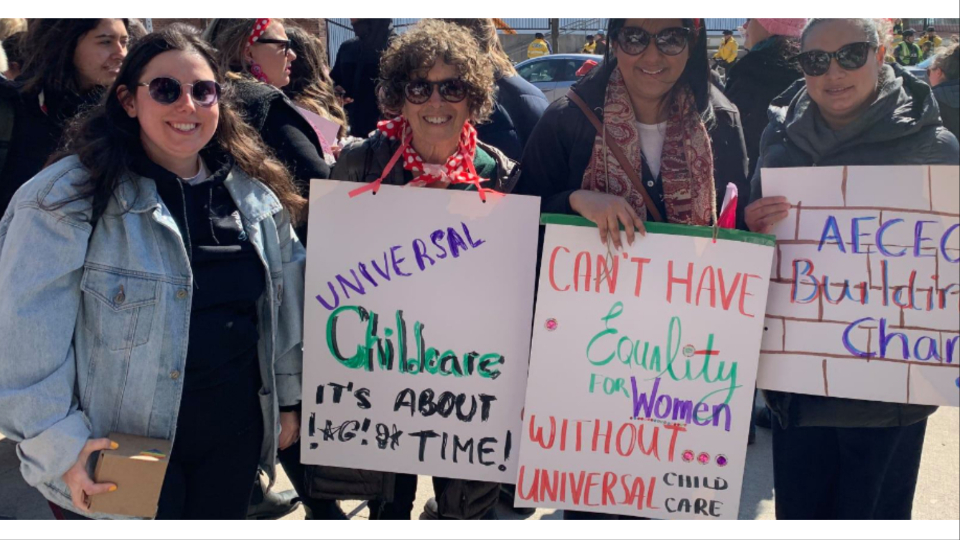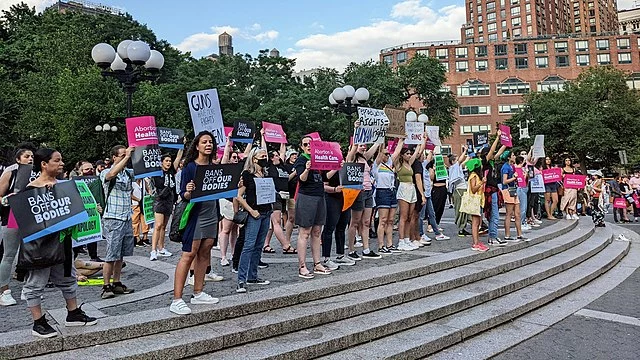Ask anyone in the women’s movement what they believe is the most important program to ensure women’s equality, and they more often than not will reply, “childcare.” That’s why the Canadian federal government’s announcement that it will introduce $10-per-day childcare almost two years ago delighted those who have been fighting for a Canada-wide childcare policy and program for over half a century.
So where is the country now when it comes to implementing this promise made by Liberal Party Prime Minister Justin Trudeau?
In its deal with the federal government in March 2022, Ontario committed to creating 86,000 new spaces at $10 per day. The Conservative provincial government of Premier Doug Ford says it is 50,000 spaces short of fulfilling that target, but Ontario’s Financial Accountability Office calculates the total number of spaces needed is actually 220,000.
The most important factor, along with the increase in childcare spaces at $10 per day, is the assurance of a public, not-for-profit, quality childcare system. Ontario, along with right-wing governments in some other Canadian provinces, is doing its best to thwart the expansion of a public system in favor of providing opportunities for their corporate friends to suck profits from the care of children.
In August 2022, the Ontario Association of Independent Childcare Centres, which represents 300 for-profit daycare owners across the province, met with Education Minister Stephen Lecce who is responsible for the province’s rollout of the national childcare program. The OAICC celebrated the commitments they were able to garner from this meeting: Restrictions on “undue profits” was dropped as was a list of “ineligible expenditures,” which would have prevented operators from using public money to finance their mortgages or pay executive bonuses.
Ontario is one of four provinces allowed to use the federal money to create new for-profit spaces, and it has maximized the total number of for-profit spaces that will be created—at 25,000. The Ford government would likely push for more, but for the federal government’s 30% cap on for-profit spaces.
Take the example of Lullaboo Nursery and Childcare Centre Inc., a “mom and pop” for-profit founded in 2008. As reported by Chris Hannay in Toronto’s Globe and Mail newspaper, Lullaboo accelerated their acquisitions of former non-profits at the same time that the federal government announced a commitment to the federal affordable childcare program.
They have pledged to open 25 new locations by 2025. Their modus operandi? Cut staff wages back to minimum wage. This seems to be the case for most for-profits—of the 25% of childcare workers earning only minimum wage, most are employed at for-profit facilities. Coincidentally, for-profits make up 30% of licensed spaces for children under six years old in Ontario.
What is needed—in Ontario and across the country—is a massive expansion of publicly-owned and publicly-provided infrastructure, staffed by trained workers who are paid good wages and benefits in a unionized environment.
Childcare is important for children’s development and absolutely critical to women’s equality. It should be provided free of charge and made universally available on the basis of need in all communities, including 24-hour care for shift workers and family emergencies.
While publicly-owned infrastructure is key, expanding childcare to meet social needs also involves home-based services. The government touts this sector as central to meeting the quota of new spaces required, as home-based childcare providers can be added without adding to capital costs.
But really, both Conservative and Liberal governments give priority to home-based services as a way to divert attention and funding from public, non-profit centers.
In Quebec, which introduced universal $5-per-day childcare in 1997 (now $10-per-day), a huge proportion of the service is home-based, with roughly 12,000 homes which take care of between six and nine children every day. The government reaps the benefit of these thousands of individual women (they are almost exclusively women-run) providing publicly-funded childcare spots for around 40,000 children, without having to provide any infrastructure.
The situation led to a strike by over 13,000 unionized home-based childcare providers in September 2020, demanding better pay and working conditions.

It is a perverse irony that capitalist politicians would seek to expand universal childcare on the backs of low-paid women workers. This must not be allowed. There are unionized home-based childcare agencies, like Macauley Child Development Centre, which provide optimum support for providers and pay a higher wage than for-profit or individually licensed home-based providers.
Any expansion in the home-based childcare field must come with supports and wage enhancements and an aggressive campaign to favor unionized agencies.
Lack of worker retention due to inadequate pay is another major concern of childcare advocates across Canada. As we saw in the aftermath of Bill 24 in Ontario, which capped wage and benefit increases for nurses (and broader public sector workers in general) at 1% through the pandemic, lower wages coincided with a more transient workforce and more workers exiting the workforce, which disrupts the entire system.
In the case of Lullaboo, once wages were slashed to minimum wage, 16 of their 19 staff at one facility quit.
The federal childcare agreement will also result in more money being funneled into private operators. Federal funding subsidizes half of whatever parents were paying on March 27, 2022, when the deal was signed. Commercial operators tend to have higher fees than non-profits. As a result, more money will be going to for-profits in Ontario than they would in any other province. The payments will take away money that would be better used to expand non-profit spaces overall.
One answer to block the explosion of for-profits is to fight for the expansion of municipally-run childcare centers. In Toronto, CUPE Local 79 represents childcare workers at the city’s 45 centers. They are the highest paid workers in the sector, and other unionized centers use city wages as their targets in bargaining every contract.
Russell Township, southeast of Ottawa, recently took over the 186 spaces from a private daycare that closed during the pandemic. In addition, they approved a 20% salary increase for childcare staff to try to recruit and retain educators.
According to Morna Ballantyne, executive director of advocacy group Child Care Now, “Municipalities should get more involved in directly providing childcare, establishing centers where they are most needed.” A sustainable childcare system could be guaranteed if other municipalities follow Russell Township’s example.
There is still much to fight for in the expansion of a more affordable, Canada-wide universal childcare system. We must continue to advocate for public, quality, unionized childcare centers and fight against any privatization in the sector.
Like long-term care homes, the profit motive must be eliminated for these vital public services. There should be no profits made from the quality of care given to either the youngest or eldest members of society.
People’s Voice
Originally published in People’s World






